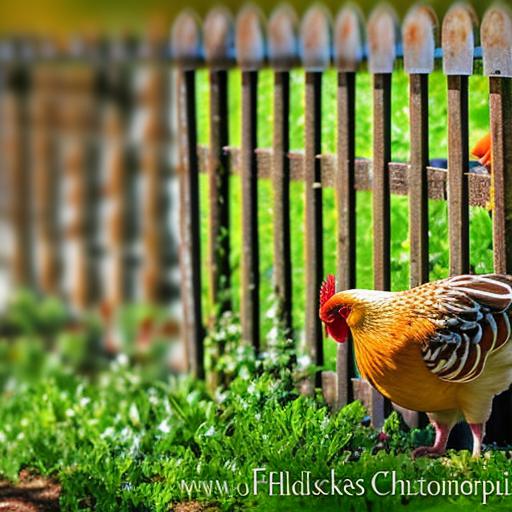Chickens can be wonderful pets, providing fresh eggs and entertainment. However, they can also wreak havoc on your garden if left to roam freely. They have a natural instinct to scratch and peck at the ground, which can lead to damaged plants and uprooted seedlings. Fencing your garden is an effective way to keep chickens out and protect your plants. By understanding their behavior and habits, choosing the right type of fence, and maintaining it properly, you can enjoy a beautiful and bountiful garden while keeping your feathered friends at bay.
Key Takeaways
- Fencing your garden from chickens is important to protect your plants and maintain a healthy garden.
- Understanding your chickens’ behavior and habits can help you choose the right type of fence for your garden.
- Choosing the right type of fence for your garden is crucial to keep chickens out and protect your plants.
- Installing a chicken-proof fence requires careful planning and execution, but it is worth the effort to protect your garden.
- Maintaining your garden fence and using alternative methods can help keep persistent chickens away and protect your garden from other pests and predators.
Understanding Your Chickens’ Behavior and Habits
Chickens are curious creatures that love to explore their surroundings. They have a natural instinct to scratch and peck at the ground in search of insects, worms, and other tasty treats. This behavior can be detrimental to your garden if they are allowed unrestricted access. They can uproot plants, damage delicate seedlings, and create unsightly holes in your garden beds.
In addition to their scratching behavior, chickens are also great escape artists. They are adept at finding ways to get into places they shouldn’t be. They can squeeze through small openings, fly over low fences, or dig under barriers. It is important to understand these behaviors when choosing a fence for your garden.
Choosing the Right Type of Fence for Your Garden
When it comes to fencing your garden from chickens, there are several options to consider. One of the most common types of fencing used is chicken wire. Chicken wire is a lightweight and affordable option that can effectively keep chickens out of your garden. It is important to choose a wire mesh with small enough openings to prevent chickens from squeezing through.
Another option is electric fencing. Electric fences emit a mild shock when touched, which can deter chickens from attempting to cross the barrier. Electric fences are effective but require proper installation and maintenance to ensure they are functioning correctly.
Wooden fences are another option for keeping chickens out of your garden. They provide a more aesthetically pleasing option and can be customized to fit the style of your garden. However, wooden fences may require more maintenance and can be more expensive than other options.
When choosing a fence for your garden, consider the size of your garden, the number of chickens you have, and your budget. It is important to choose a fence that is tall enough to prevent chickens from flying over or jumping over it. Additionally, make sure the fence is buried deep enough to prevent chickens from digging under it.
Installing a Chicken-Proof Fence: Step-by-Step Guide
| Step | Description | Time Required |
|---|---|---|
| 1 | Measure the perimeter of the area to be fenced | 30 minutes |
| 2 | Choose the type of fence and materials needed | 1 hour |
| 3 | Prepare the ground by removing any obstacles and debris | 2 hours |
| 4 | Install fence posts at regular intervals | 4 hours |
| 5 | Attach fence wire to posts and secure with staples or clips | 6 hours |
| 6 | Install a gate for easy access | 2 hours |
| 7 | Inspect fence for any gaps or weak spots | 30 minutes |
| 8 | Test fence by attempting to breach it | 1 hour |
Installing a chicken-proof fence requires careful planning and execution. Here is a step-by-step guide to help you get started:
1. Measure and mark out the area you want to fence: Start by measuring the perimeter of your garden and marking out where you want the fence to go. This will help you determine how much fencing material you will need.
2. Dig post holes and install fence posts: Use a post hole digger or an auger to dig holes for your fence posts. The depth of the holes will depend on the height of your fence. Place the posts in the holes and fill them with concrete or gravel to secure them in place.
3. Attach the fence material to the posts: Once the posts are secure, attach the chosen fence material to them. If using chicken wire, use staples or zip ties to secure it to the posts. If using electric fencing, follow the manufacturer’s instructions for installation.
4. Add any necessary gates or doors: If you need access to your garden, add gates or doors to your fence. Make sure they are secure and can be easily opened and closed.
Tips for Maintaining Your Garden Fence and Keeping Chickens Out
Once your garden fence is installed, it is important to regularly maintain it to ensure it remains effective in keeping chickens out. Here are some tips for maintaining your garden fence and keeping chickens away:
1. Regularly check for any holes or gaps in the fence: Inspect your fence regularly for any holes or gaps that chickens could squeeze through. Repair any damage immediately to prevent chickens from getting in.
2. Keep the area around the fence clear of debris and vegetation: Clear away any debris or vegetation that could provide a foothold for chickens to jump over the fence. Trim back any overhanging branches that could allow chickens to fly over the fence.
3. Use deterrents like motion-activated sprinklers or reflective tape: Consider using deterrents like motion-activated sprinklers or reflective tape to keep chickens away from your garden. These can startle and deter chickens from approaching the fence.
Alternative Methods for Keeping Chickens Away from Your Garden

If you find that fencing alone is not enough to keep chickens out of your garden, there are alternative methods you can try. One option is to use raised garden beds or containers to keep your plants out of reach. This can be especially effective for smaller gardens or areas where fencing may not be practical.
Another option is to create a designated area for your chickens to scratch and peck. By providing them with their own space, they are less likely to venture into your garden. This can be done by using chicken tractors or movable pens that can be rotated around your yard.
Dealing with Persistent Chickens: Troubleshooting Your Fence
If you find that your chickens are still finding ways to get into your garden despite your best efforts, there are a few troubleshooting steps you can take. First, consider adding additional fencing or using a different type of fence that may be more effective in keeping them out.
Another option is to use chicken wire or netting to cover the top of your garden. This can prevent chickens from flying or jumping over the fence and accessing your plants. Make sure the netting is securely fastened to prevent any gaps or openings.
Protecting Your Garden from Other Pests and Predators
Fencing your garden not only keeps chickens out but can also protect it from other pests and predators. Animals like rabbits, deer, and raccoons can cause significant damage to your garden if left unchecked. By installing a sturdy fence, you can create a barrier that prevents these animals from accessing your plants.
In addition to fencing, consider adding additional measures like netting or repellents to keep these animals away. Netting can be used to cover individual plants or entire garden beds to prevent animals from reaching them. Repellents, such as sprays or ultrasonic devices, can also be effective in deterring pests and predators.
The Benefits of Fencing Your Garden for Both You and Your Chickens
Fencing your garden provides benefits for both you and your chickens. For you, it allows you to enjoy a beautiful and productive garden without the worry of it being destroyed by chickens or other pests. It also provides a sense of security knowing that your plants are protected.
For your chickens, fencing provides a safe and healthy environment. It prevents them from accessing potentially harmful plants or ingesting toxic substances. It also helps to establish boundaries and keeps them from wandering into areas where they could get injured or lost.
Enjoying a Beautiful and Bountiful Garden with Your Feathered Friends
Fencing your garden is a great way to enjoy the benefits of both gardening and keeping chickens. By understanding their behavior, choosing the right type of fence, and maintaining it properly, you can have a beautiful and productive garden while keeping your chickens happy and healthy. With the right type of fence and some maintenance, you can enjoy the best of both worlds – a thriving garden and the joy of keeping chickens.
If you’re looking for a solution to keep chickens out of your garden, you might want to consider installing a fence. A sturdy fence can help protect your plants and keep your feathered friends from causing any damage. To learn more about the benefits of using a fence to keep chickens out of your garden, check out this informative article on Poultry Wizard: https://poultrywizard.com/keeping-chickens/garden-chicken-coop/.
FAQs
What is a fence to keep chickens out of the garden?
A fence to keep chickens out of the garden is a physical barrier that is erected around a garden to prevent chickens from entering and damaging the plants.
What materials can be used to build a fence to keep chickens out of the garden?
Common materials used to build a fence to keep chickens out of the garden include chicken wire, hardware cloth, welded wire mesh, and electric netting.
How high should a fence to keep chickens out of the garden be?
The height of a fence to keep chickens out of the garden depends on the breed of chicken. Generally, a fence that is at least 4 feet high is sufficient to keep most breeds of chickens out of the garden.
What are the benefits of using a fence to keep chickens out of the garden?
The benefits of using a fence to keep chickens out of the garden include protecting the plants from damage, reducing the risk of disease transmission from chickens to plants, and preventing chickens from eating or contaminating produce.
What are some tips for building a fence to keep chickens out of the garden?
Some tips for building a fence to keep chickens out of the garden include burying the fence at least 6 inches deep to prevent chickens from digging under it, ensuring that the fence is tall enough to prevent chickens from flying over it, and using sturdy materials that can withstand the weight and pressure of chickens.
Meet Walter, the feathered-friend fanatic of Florida! Nestled in the sunshine state, Walter struts through life with his feathered companions, clucking his way to happiness. With a coop that’s fancier than a five-star hotel, he’s the Don Juan of the chicken world. When he’s not teaching his hens to do the cha-cha, you’ll find him in a heated debate with his prized rooster, Sir Clucks-a-Lot. Walter’s poultry passion is no yolk; he’s the sunny-side-up guy you never knew you needed in your flock of friends!







